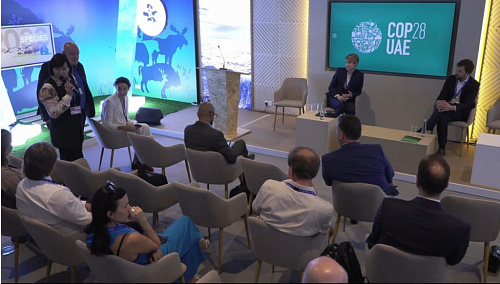On 5 December, the 28th Conference of the Parties to the UN Framework Convention on Climate Change (COP28) hosted the Day of Russian Science organised by the Ministry of Science and Higher Education of the Russian Federation, Roshydromet and the Andrey Melnichenko Foundation. Irina Akhmedova, Associate Professor at the YuSU Higher School of Ecology, made a presentation on "The Role of Wetlands in the Carbon Balance", sharing her experience of working at the Mukhrino carbon polygon.
The programme consisted of three blocks: "The Science of Climate Change and Climate Impacts", "Russian Carbon Polygons: a Pilot Project to Develop and Test Carbon Control Technologies" and "Climate Economics, Adaptation and Mitigation Pathways, Knowledge Dissemination".
The first part of the work was devoted to scientific research in the field of climate, its implementation and impact on Russia, absorption of greenhouse gases, and mitigation of climate change. Andrey Melnichenko, Chairman of the RUIE Committee on Climate Policy and Carbon Regulation, emphasised that currently planning efforts in the climate agenda and implementation of many projects are complicated due to insufficient scientific knowledge in the field of climate change. He expressed his hope that the combined efforts of Russian science, government and business could achieve truly ambitious results.
In the second part, representatives of carbon polygons - participants of the pilot project of the Russian Ministry of Education and Science shared their experience of the programme implementation.
Irina Akhmedova presented a report on "The role of wetlands in carbon balance". Irina Dmitrievna told about scientific research at the Mukhrino carbon test site related to the study of the level of wetland water, dynamics of peat accumulation, carbon content in wetland water, climate education programmes of the university, and also about the fact that a regional network of carbon test sites is being developed in Yugra - in addition to the Mukhrino station, the Kondinskiye Lakes Nature Park and Numto, this list will include the territories of Samotlor and Salym. This will make it possible to cover the entire territory of the region and assess the carbon balance of the Autonomous Okrug's territory in the most accurate way.
"The unique experience of our polygon, development and implementation of climate projects in cooperation with industrial partners, support of the Yugra government allow us to enter several important projects being implemented in Russia. Today we all are already observing climate change and feel its consequences. It is important to work out measures of adaptation to climate conditions, and it is possible to solve the existing problems only by joining joint efforts. This is why we have gathered at this platform, to establish contacts and expand mutual cooperation," commented Irina Dmitrievna.
In the third section of the programme, Elena Shmeleva, Chairman of the Council of the federal territory of Sirius, spoke about the importance of involving young people in solving environmental and climate problems and the new programme of ecological-technological tourism.
"Today on this symbolic platform, I would like to discuss with you the climate aspect of the children's environmental and technological tourism programme initiated by Sirius. The programme will cover the whole of Russia, and therefore you and I have the opportunity to introduce children to climate research conducted by scientific institutes and universities in various regions," said Elena Shmeleva.
The idea of this project is to bring together science, industry and youth to address the challenges of modern climate change.
We remind that the first Russian Children's Carbon Polygon was launched at the research complex in Shapsha. Thus, YuSU obtained an opportunity to implement educational and outreach programmes for children and youth, involving them in solving real scientific and production problems.
The final part of the Day of Russian Science included a presentation of the Pleistocene Park project located in Yakutia - a scientific experiment, the main objective of which is to slow down the process of permafrost thawing in the Arctic by restoring the late Pleistocene ecosystem and introducing large herbivorous animals to the tundra.
COP28 will last until 12 December. Over 70,000 delegates from different countries, including representatives of big business and non-governmental organisations, as well as researchers, experts and journalists, are taking part.
